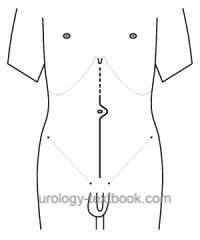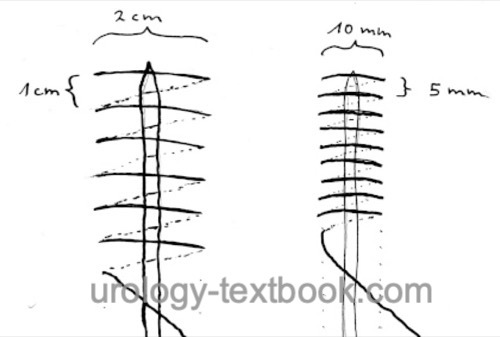You are here: Urology Textbook > Urologic surgery > Midline laparotomy
Midline Laparotomy: Surgical Steps and Wound Closure
Urologic Indications for Midline Laparotomy
- Retroperitoneal lymphadenectomy
- Radical Nephroureterectomy
- Radial nephrectomy for large renal tumors
- adrenalectomy for large malignant adrenal tumors
- Radical cystectomy
- Renal trauma
Patient Positioning:
The patient is in a supine position with slight hyperextension of the lumbar spine.
Surgical Technique (Step by Step) of a Median Laparotomy
Use a midline skin incision; see fig. midline laparotomy. The length of the laparotomy depends on the operation: full length is needed for retroperitoneal lymphadenectomy or nephroureterectomy. For cystectomy, a lower midline incision reaching from the symphysis to just above the umbilicus is done. For nephrectomy, a laparotomy incision from the xiphoid to just below the umbilicus is often sufficient.
 |
After exposure of the ventral lamina of the rectus sheath, dissect the linea alba above the umbilicus. Grasp the peritoneum with forceps, elevate and dissect, and insert two fingers into the abdominal cavity. If there are no adhesions, laparotomy is quickly extended as needed with a scalpel or scissors, the hand in the abdominal cavity protects the bowel.
| Do you want to see the illustration? Please support this website with a Steady membership. In return, you will get access to all images and eliminate the advertisements. Please note: some medical illustrations in urology can be disturbing, shocking, or disgusting for non-specialists. Click here for more information. |
| Do you want to see the illustration? Please support this website with a Steady membership. In return, you will get access to all images and eliminate the advertisements. Please note: some medical illustrations in urology can be disturbing, shocking, or disgusting for non-specialists. Click here for more information. |
Wound Closure after Laparotomy
The risk of incisional hernia in upper midline incisions is 10–20%; careful fascial closure can reduce the risk. The current standard is the continuous running double loop suture (monofilament, elastic, slowly absorbable, suture size USP 0 or 1); the closure of the abdominal cavity should be done without tension using all-layer bites [fig. wound closure of midline laparotomy]. The suture should bite about 1 cm of the abdominal wall with a maximum 1 cm intersuture spacing, leading to a suture-length:wound-length ratio of 4:1. A modern alternative to the all-layer suture is the short stitch technique, continuous running suture size 0 or 2-0 with tissue bites of 5 mm and intersuture spacing of 4--5 mm are applied exclusively to the fascia (linea alba). Low tension of the suture is crucial in the short stitch technique to avoid hernia. In direct comparison, the short stitch technique is superior to the standard procedure (Deerenberg et al., 2015).
 |
| Urologic surgery | Index | Subcostal incision |
Index: 1–9 A B C D E F G H I J K L M N O P Q R S T U V W X Y Z
References
E. B. Deerenberg et al., “Small bites versus large bites for closure of abdominal midline incisions (STITCH): a double-blind, multicentre, randomised controlled trial.,” Lancet, vol. 386, no. 10000, pp. 1254–1260, 2015, doi: 10.1016/S0140-6736(15)60459-7.
J. A. Smith, S. S. Howards, G. M. Preminger, and R. R. Dmochowski, Hinman’s Atlas of Urologic Surgery Revised Reprint. Elsevier, 2019.
 Deutsche Version: Mediane Laparotomie
Deutsche Version: Mediane Laparotomie